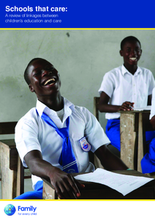This report presents the key findings of a scoping study on the links between education and children’s care. The study involved a literature review in English, French and Spanish; key informant interviews; and consultations with 170 children, carers, teachers and other stakeholders in Guyana, India, Russia and Rwanda.
The evidence presented in this report suggests that a lack of access to quality education is a key cause of inadequate care. Children who are pressured or forced away from families and into exploitative work, early marriage or life on the streets are a greater risk of dropping out of school. In many countries, children are placed in harmful large-scale institutions to access education that is not available locally. Those that remain in local schools often face violence and abuse in unsafe school environments, which can lead to them dropping out of school, increasing the risk of family separation. In order to access schooling, children are often placed with extended families or wider kinship networks. In some cases, this can lead to deterioration in children’s care, especially when children live with more distant relatives. Lack of access to school can also hinder the effective reintegration of separated children. Some groups of children are more vulnerable than others to inadequate care caused by a lack of access to education. These groups include children with disabilities, girls, children living in poverty and displaced, refugee, migrant and minority groups.

